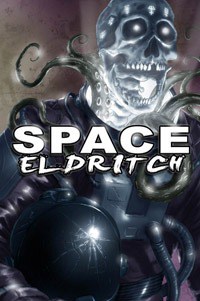
This review also appears on Goodreads.
This is a long article. If you’re not interested in long articles, the short version is that I like Space Eldritch very much, and I recommend you buy it immediately so that you too can like it very much. The long version follows.
One of the great allures of H.P. Lovecraft’s writing was that it didn’t so much cross genres as it did appropriate from them to make something uniquely his own. There was a strong element of fantasy in his work: dark fantasy, certainly, but his world was filled with history, ancient civilizations, magic, monsters, prophecies, secret societies, and mysteries that defied the rational mind. There was an equally strong element of science fiction: the Elder Gods were wholly alien to us, they possessed intimate knowledge of the way the universe worked, and many of their servitors were actually aliens from other planets, and used unknown technologies to pursue their goals. Even the magic in his stories was a hybrid of science, with mathematical calculations included in profane incantations.
But behind it all, Lovecraft’s mythos was horror: in his stories, the world we know is a veneer at best, and often simply a feeble lie told in the face of unimaginable horrors. Mankind, secure in its belief that it knew everything important about the universe, was unaware that most of what it knew was wrong and the rest was simply inadequate. There was a book that would tell you the truth about everything, but reading it would drive you insane. And there were things out there that could very easily destroy humanity—wipe us off the face of the earth, without a trace that we were ever here—and the only reason they hadn’t was they hadn’t noticed us yet.
It is a grim, bleak world, but the immensity and monstrosity of that bleakness brings with it a sense of wonder. It’s that wonder that ultimately dooms the characters in his stories, and will ultimately doom humanity, because humanity is enthusiastic about “piercing the veil,” but wholly incapable of handling what it finds on the other side.
It is in this kind of world that the stories in Space Eldritch exist. Space Eldritch is described as “a volume of seven original novelettes and novellas of Lovecraftian pulp space opera.” It attempts to place the Lovecraft mythos in the context of science fiction, and it succeeds quite well.
It might seem, at first pass, that a marriage of Lovecraftian horror and science fiction would be doomed to failure. One of the core premises of most science fiction is that the universe exists according to rules that we can learn and use to our benefit. The universe may be impersonal and hostile, but it is manageable, to a certain extent—the future is a harsh and unforgiving frontier, but in the grand tradition of frontiers it can be tamed. This basic worldview is antithetical to Lovecraft’s universe—there are rules to the universe, but they are beyond our comprehension. The universe is not only impersonal and hostile, but our attempts to understand it and tame it are annihilated as soon as we get even the slightest exposure to the malevolence and predation that lurks in wait. In Lovecraft’s mythos, science turns out to be as full of hubris as religion, and neither are capable of protecting us from anything—at best, and its most heroic, men of faith and science are able to stave off our annihilation for a time, to give humanity a little more breathing room before our doom, but usually they survive just long enough to realize exactly how wrong they were, then die horribly.
This is why a science fiction setting works so well. In a science fiction setting, we move beyond the advances of the early 20th century into something more than what we have now: by all appearances, science has stayed true to its promise, the universe has revealed more of its secrets, and we are slowly strengthening our claim on the cosmos. In short, our hubris has grown, and so the stage is set for our fall to be that much greater.
Which leads us to the stories themselves.
Something that I really like about these stories is that they have a very distinct feel from one another—they’re all science fiction, they all tap into Lovecraftian themes in a direct way, but they also represent different flavors of science fiction. It’s as if someone said “yes, Lovecraft can work within any sub-genre of science fiction you can think of, and we’re going to choose sub-genre’s out of a hat at random to prove it!” Each piece is stylistically different, and each piece works well.
“Arise Thou Niarlat from Thy Rest” by D.J. Butler, the first story in the series, is also one of the most firmly-rooted in the Lovecraft mythos. It mentions Miskatonic University and references the Necronomicon. It’s the perfect opener, because it has a little bit of everything: black magic, time travel, fancy technology, evil cults, imprisoned horrors, incomprehensible things, murder, mayhem, and terrible, desperate choices.
“Space Opera,” by Michael R. Collings, is another story that directly ties in to Lovecraft’s mythos, but it subverts it rather cleverly by telling the story from the perspective of what might be described as a “mid-list” horror… and we learn that even monsters have hubris. Stylistically, it is aptly named—the aliens aren’t explained, they just are. No attempt is made to justify them, or explain their biology, or explore the evolution of their society, and none of that is at all necessary. In many ways, Space Opera is perfectly suited to Lovecraft, because thematically it already lends itself to huge, sweeping stories and scales so vast there’s no point in explaining them.
The other five stories are not as explicitly part of Lovecraft’s mythology (or, if they are, I didn’t recognize where they fit) but they are completely compatible with it.
“The Menace Under Mars,” by Nathan Shumate, is a first contact story gone horribly wrong. This may well be my favorite story of the lot, though the setting is a little cumbersome to adjust to at first (it takes place in an alternate history where the first manned mission to Mars occurred in the 1950s, and I could never figure out why.) Stylistically it has the feel of a quality 1950s or 1960s science fiction story, as if Asimov (or a temporarily politically subdued Heinlein) decided to write a Lovecraft story. This is a good thing—the 50s and 60s produced some really good writing, and produced stories that are still influential in the genre sixty years later.
“Gods in Darkness,” by David J. West, has the most “pulpy” feel of all the stories. One of the protagonists is very square-jawed (though not exactly virtuous), and the villain comes very close to twirling his mustache. Interestingly enough, it’s also the most detailed when it comes to describing the intricacies of fighting in space. It is set in a “secret history,” during the Cold War but featuring Technology That Doesn’t Officially Exist. Its ending is a pretty satisfying subversion of the Lovecraftian norm.
“The Shadows of Titan,” by Carter Reid and Brad R. Torgersen, is another first contact story gone horribly wrong, but stylistically is very different from Shumate’s. As I read it I felt it had a very Niven/Pournelle vibe. There are parts of it that would fit very well in Niven’s “Known Space” universe.
“The Fury in the Void,” by Robert J. Defendi, is set in a post-cataclysmic future where technology has been integrated into religion, where science is taught through litanies and catechisms, and where a schism in the Greek Orthodox Church has created a long-running religious interstellar war between the Greeks and the Russians. It’s an intriguing “what if” formulation that works well in the story.
“Flight of the Runewright,” by Howard Tayler, is probably the darkest of the stories, and the closest to pure horror. It’s a future where the technology of spaceflight has been abandoned in favor of a very dangerous shortcut. This story was of particular interest to me—I confess it’s the reason I bought the book. I’m a long-time fan of Schlock Mercenary, so I knew he knew how to tell a science fiction story, but I’d never had a chance to read his prose. The story is beautifully written. It’s the only story told in first person, present tense—a very difficult POV to stick to, not to mention to make work, and Tayler makes it work in spades. First-person-present means you learn everything at the same time the protagonist does, which eliminates the distance between you and the story and gives everything a haunted, claustrophobic feel. The protagonist’s (wholly justified) preoccupation with patterns, and the details Tayler provides of his surroundings, made me pay obsessive attention to every detail in the story, wondering if this was the thing that would finally do it, finally make it all go straight to hell, possibly in a very literal sense. As an added bonus, Tayler presents the perfect rationale for why humanity would choose to do something so very, very colossally stupid (one of my favorite lines in the story).
If this review seems to dwell more on generalities and themes instead of speaking directly to the stories themselves, that’s because it’s difficult to talk specifically about the individual stories in Space Eldritch without giving anything away. That’s one of the reasons I keep comparing these stories to other stories, other subgenres, and other authors. When I compare these stories to the works of other authors, I don’t actually believe that they are specifically pastiches or homages. Each story in Space Eldritch is uniquely its own, and when I say “this reminds me of Niven/Pournelle” what I mean is “here’s an example of something Niven/Pournelle did very well, that this story also does very well, but with tentacles.”
It’s the best way I can think of to discuss the stories without actually talking about the parts I want to talk about.
The parts I want to talk about are spoilers—the moments of revelation when the reader finally understands what’s going on, even when the protagonists don’t, the moments when the protagonists do, and have to make terrible choices and put everything on the line in order to defend humanity, the moments when the true face of the enemy appears and the gibbering begins, the moments where everything is set, nothing can be changed, but there is still a terrible, gnawing, doubt. Those are the reasons you want to read the stories in the first place—talking about them would do the stories, and you, a disservice.
If you want to know more about the parts I want to talk about (but won’t) then you absolutely need to buy this book.
Space Eldritch, published by Cold Fusion Media:
Forward by Larry Correia, stories by D.J. Butler, Michael R. Collings, Nathan Shumate, David J. West, Carter Reid, Brad R. Torgersen, Robert J. Defendi, and Howard Tayler.
Available as an eBook at Amazon, Barnes & Noble, and Smashwords

